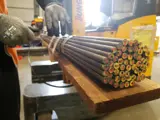What’s the difference between titanium alloy and pure titanium
In the fast-paced world of aerospace and automotive, choosing the right material can be the difference between success and failure. We get asked by design engineers for detailed information on titanium specifications all the time. One of the most common questions we get is what’s the difference between pure titanium and titanium alloys.
Pure Titanium
Pure titanium, also known as commercially pure (CP) titanium is more than 99% titanium with only trace amounts of oxygen, iron and nitrogen. It’s classified into four grades (Grades 1-4) based on the amount of oxygen and iron and each grade has its own performance characteristics.
The properties of pure titanium are:
- Exceptional corrosion resistance especially in saltwater environments
- Lower tensile strength compared to alloys (275-550 MPa)
- Better formability and weldability
- Biocompatibility for medical applications
- Density of around 4.5 g/cm³, about 60% of steel
In aerospace pure titanium is used in airframe skin sections because of its excellent corrosion resistance even with moderate loads. In the automotive industry it’s used in exhaust systems where heat resistance and corrosion protection is critical.
Titanium Alloys: Engineered for Performance
Titanium alloys on the other hand have additional elements to enhance specific properties. The most common titanium alloy Ti-6Al-4V (6% aluminium and 4% vanadium) accounts for nearly 50% of all titanium used in aerospace and automotive.
The differences with titanium alloys are:
- Much higher strength (up to 1200 MPa tensile strength)
- Better temperature performance, some alloys can maintain structural integrity up to 600°C
- Tailored properties through heat treatment
- Lower formability than pure titanium
- More complex welding requirements
Titanium alloys are used in aerospace for critical parts like engine mounts, landing gear structures and compressor blades where strength to weight ratio is crucial. They are also used in connecting rods, valves and structural components in Formula 1 and high performance automotive.
Applications drive the choice
It’s not just about picking the better material, it’s about picking the right one for your performance needs. For applications that need corrosion resistance, formability and moderate strength pure titanium is the most cost-effective option. But when high tensile strength, fatigue resistance and performance at elevated temperatures are critical engineered alloys are the better choice.
Heat Treatment: A key discriminator
A key difference between pure titanium and its alloys is how they respond to heat treatment. Pure titanium does not gain strength from heat treatment. Titanium alloys especially α+β alloys like Ti-6Al-4V can gain a lot from solution treatment and aging process so manufacturers can optimise their mechanical properties.
Manufacturing Considerations
Only someone with specialised expertise can properly handle these materials. Tool adherence to pure titanium occurs during shaping because inadequate instruments fail to maintain proper adhesion. Controlling surrounding air conditions is essential while welding titanium alloys to prevent brittleness of the metal.
Our metal experts from Dynamic Metals help clients regarding these matters. Our team ensures clients select suitable materials according to their application needs.
Beyond Strength: The Complete Picture
Engineers should analyse the complete performance characteristics of titanium materials when making selection choices. Although strength is often the focus, factors like fatigue resistance, crack propagation characteristics, and corrosion behavior in specific environments are just as crucial for determining service life. By understanding these subtle differences, we can ensure that our aerospace and automotive clients get materials that are perfectly suited to their performance needs, fostering innovation in these challenging industries.
Need more information? Get in touch

